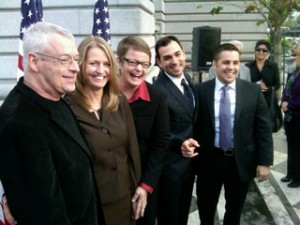To look at just one aspect of the constitutional merits or lack of same addressed at the Ninth Circuit hearing, check out the report on KQED’s Prop 8 blog by Dan Brekke, written after the December, 2010 hearing. He pulled the following analysis about the constitutional question from Brian Leubitz, publisher of the Calitics blog, who wrote for the Prop 8 Trial Tracker, a pro same-sex marriage site. Leubitz focused on an exchange between Judge N. Randy Smith and attorney Charles Cooper, representing the proponents of Proposition 8, over the significance of the word “marriage”:
Judge Smith focused a couple times on whether the State of California was in a worse position for having passed Prop 8 because it has given all of the same rights and privileges under the auspices of the domestic partnership statute. In other words, if we are only fighting over a word, and no substantive differences at the state level, aren’t we essentially creating a subclass? And roughly transcribed, here’s what [Charles] Cooper [attorney for Prop. 8 proponents] said:
Cooper: The word is the institution. If you redefine the word, you change the institution.
I actually think this was a big moment of the oral argument. It said that yes, the anti-equality forces were there only to “put down” gays and lesbians, or as San Francisco Deputy City Attorney Therese Stewart said, [from my rough notes]…
If the word is the institution, then the argument is just that gays and lesbians would “stain” the institution. The fact that Prop 8 is symbolic, it makes the insult obvious. This is classification for its own sake, and it violates the equal protection clause. Taking these components together, it infers animus.
If we only passed Prop 8 to show that same-sex couples aren’t as good, or as worthy as other couples, then isn’t the equal protection argument plain to see? It reveals the naked schoolyard taunting aspect of Prop 8. Nah-nanny-boo boo, you aren’t as good as me. And frankly, nanny-boo-boo isn’t a valid use of state authority.
Brekke continued…
Theodore Olson, representing the plaintiffs trying to overturn Prop. 8, also took note of “the word.” He started his argument with a bang, saying “this court should focus on the fundamental fact that California has engraved discrimination on the basis of sex and sexual orientation into its fundamental governing charter.”
Olson stressed that the character of Proposition 8 went beyond simply prohibiting same-sex marriage because it reversed a right established by the state Supreme Court in 2008. (For you California initiative history fans, he cited a case from the 1960s, Reitman v. Mulkey, in which the state high court–affirmed by the U.S. Supreme Court–struck down a state initiative that encouraged discrimination in housing sales.
Judge N. Randy Smith suggested the state might indeed have a rational basis for observing a distinction between opposite-sex and same-sex couples—a suggestion Olson rejected. The judge persisted, leading Olson to seize on Cooper’s “the word is the institution” argument:
Smith: Now just sit the question—the idea of distinguishing marriages from domestic partnerships in name only, to promote it as a vehicle for procreation, all else being equal, children likely to thrive when raised by father and mother who brought them into this world—that it is irrational?
Olson: Yes. In the first place, Mr. Cooper specifically said just a few moments ago ‘the name is the institution.’ Those are his words virtually verbatim. The name is the institution, and the witnesses at this trial, the witnesses that came forward and were willing to be cross-examined and were willing to testify under oath, not the law review articles and so forth that were put forth by the proponents, but the witnesses that came forward in this case, and the plaintiffs and other witnesses in this case talked about what marriage meant to them and what it means in this society as an institution. Not just what the [California] Supreme Court said, but we had what the plaintiffs said, what the experts said, what the Supreme Court said, and what the district court found. And there’s nothing that would suggest that children would thrive in a better way in that environment. In fact, the proponents’ expert, Mr. Blankenhorn, testified that the children in those relationships [same-sex households] would be better off, that we would be a better country, that we would be closer to the American ideal, if same-sex marriage were permitted.
